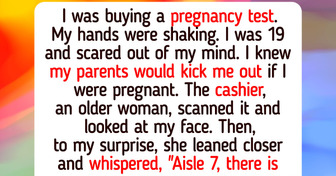Y'all this is fake, calm down!
I Refuse to Delay My Retirement to Help My Sick Daughter
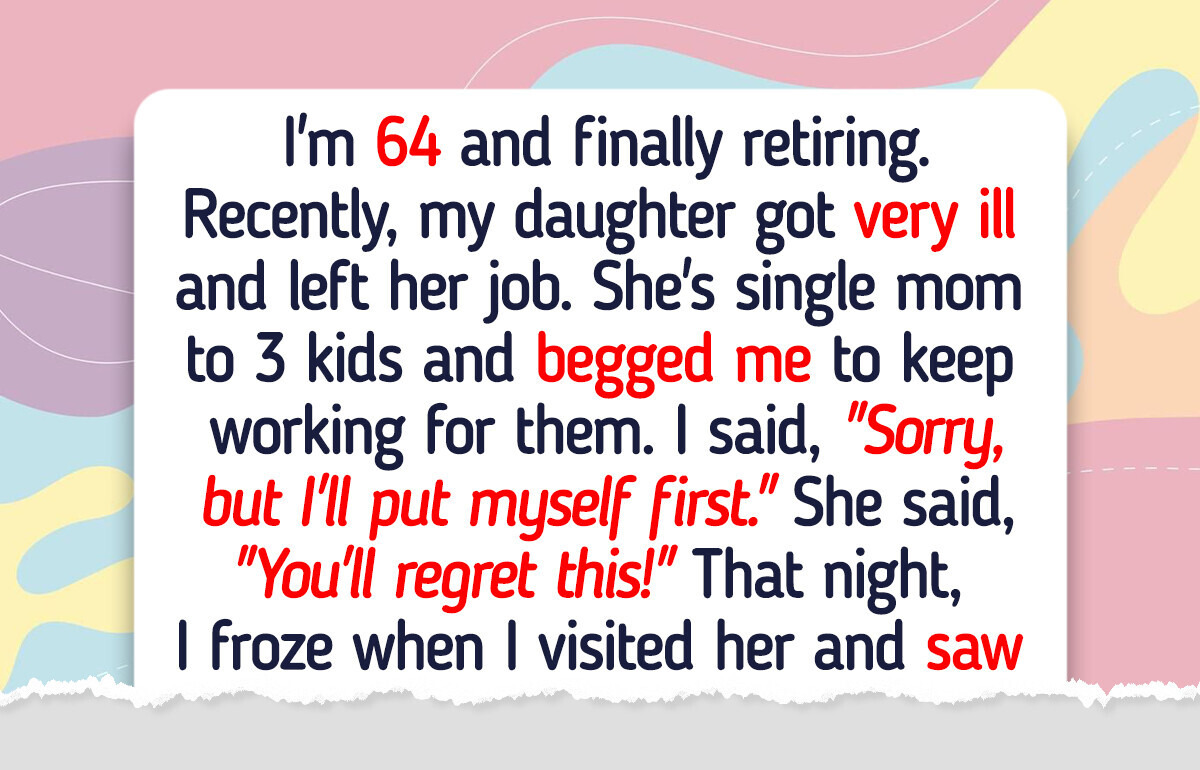
Retirement is something many people look forward to after spending decades working hard and caring for others. It’s a time to finally rest, enjoy life, and focus on personal dreams that may have been put on hold. But for some, reaching this stage comes with unexpected challenges and difficult decisions—especially when family responsibilities don’t stop, even after the job does. Recently, one reader wrote to Bright Side to share her emotional story about facing this very situation.
Katherine’s letter:
Dear Bright Side,
My name is Katherine. I’m 64 and finally retiring after 45 years of work.
Recently, my 27-year-old daughter became very ill and left her job. She’s a single mom to three kids and begged me to keep working to support her and the kids. I told her, “I’m sorry, but I need to put myself first.”
She shouted, “You’ll regret this!”
Later that night, I decided to visit her, just to make sure everything was okay. When I got there, a wave of unease washed over me when I saw the house empty. It was 10 p.m., and it was unlike them not to be home, especially with school the next morning.

Just then, her son called me in tears. I froze when he told me that his mother had left him and his two younger sisters at a foster care facility. The girls were terrified and hadn’t stopped crying.
Since then, she’s refused to speak to me. The only thing she said was that she had no other option—she couldn’t support 3 children without a job, and I was her only hope. She told me I had turned my back on her.
I’m heartbroken. I don’t know what to do. I’ve spent decades working and dreaming of retirement. Now that it’s finally here, I’m being asked to give it up to carry someone else’s burden. It feels unfair. Cruel, even.
Am I selfish for choosing myself—just this once?
—Katherine
Dear Katherine,
Thank you for sharing your story—it’s deeply personal, painful, and complex. Choosing yourself after 45 years of work is not a small decision, and it’s made harder when it intersects with family crises.
You’re not selfish for wanting peace, but the situation you’re in calls for both compassion and boundaries. Here are 4 approaches to help you navigate this moment.
Take emergency custody—temporarily—and explore state support immediately.

This really makes me mad about the mother not helping her daughter. I was in the same situation when I had cancer and needed help. I was in treatments for years. Now I'm almost 50 and my parents want me to relocate over 300 miles because they don't want to move into a nursing home. I hope she has karma like my parents are experiencing now.
If your grandchildren are currently in foster care, you might consider stepping in temporarily—not as a long-term parent, but as a transitional guardian. This could protect the children from further trauma while giving you time to explore non-parental solutions.
In many states, grandparents who assume custody can access emergency welfare funds, housing subsidies, or child care aid.
- Ask yourself: Can I step in short-term without giving up retirement forever?
- Important action: Contact child welfare services or a family law attorney. Ask about kinship care programs or temporary custody that allow you to support the children without adopting a permanent parental role.
This path helps the children without locking you into a long-term sacrifice you didn’t sign up for.
Set boundaries while opening the door to rebuilding trust with your daughter.
Your daughter’s abandonment of her children was shocking and deeply hurtful—but it also came from a place of panic, mental breakdown, or desperation. That doesn’t excuse it, but understanding it might help you reach her later.
For now, let her know that:
- You will not accept being manipulated.
- You are still willing to help—but within your limits.
- You’re open to talking, when she is ready to do so, without threats or guilt.
You don’t need to take everything on to show love. Boundaries with a wounded loved one are often the only bridge to real healing.
Explore a new form of retirement that includes purpose—not full-time care.
Your dream was a well-earned retirement. That dream might still be alive—but maybe it now includes being present for your grandkids without becoming a full-time parent.
Could you:
- Retire partially while supervising a hired caregiver?
- Use some of your savings or pension to fund a nanny or shared housing with another family member?
- Volunteer a few days a week at their school or offer after-school help without taking full custody?
This hybrid path honors both your need for rest and your desire to protect your family.
Talk to a therapist specializing in family estrangement and caregiver guilt.
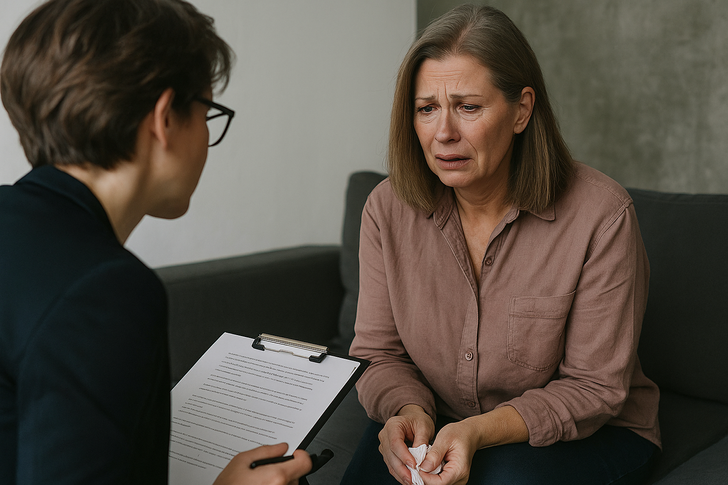
Not everyone is able to help care for children at 65. I am one of them.....where as my husband is 74 and still working casual, roughly 6 months out of 12 and loves it and is physically able to.
I think we need to know a lot more here to make a decision and comment on whether OP is right or wrong.
If the USA provides assistance to those who can't work, one has to ask why didn't she apply for this. Can she work but doesn't want to 🤷♀️
You’re dealing with an avalanche of conflicting emotions: guilt, betrayal, grief, exhaustion. A professional therapist—especially one with experience in elder-care guilt and family estrangement—could help you:
- Separate reasonable guilt from manipulated guilt.
- Process decades of giving and what it means to finally choose yourself.
- Find words and frameworks to rebuild relationships—on your terms.
You deserve a space that’s about you, not just the people asking more of you.
Linda gave up everything to move in with her ailing mother and care for her full-time—only to uncover a heartbreaking truth that changed everything. Her story is here.
Comments
Without knowing the disease or the progress of said disease, it's easy to point a finger in either direction. The grandmother is NTA for not wanting to take on full time child care responsibilities or for wanting to live her retirement free of those types of responsibilities. The mother could be depending on the severity of the disease, but there are a lot of programs available to help single mothers with housing, food, childcare without her having to fully lean on her retirement age mother to continue working full time to support an entirely separate household. They need to sit down and talk about this together, because there is a whole lot of middle ground available before splitting the entire family up.
My heart breaks for YOUR grand kids…
No guarantee foster care is safe. I’m stunned by you and your daughter both.
Failure to prepare. Her daughter just sprang a load of problems on her mother, knowing her mom had planned to retire. The kids have another parent? The daughter is wrong to just think her mother is her first line of help and that mom should put her life on hold immediately. Selfishness on the part of the daughter--your mom doesn't drop everything for you, so you dump your kids into foster care?? You tell your mom you're sick. Then you ask for her help navigating this new reality.You do not guilt trip someone from whom you're asking help. I became quite ill when I was a young adult and while I had no kids, I did not even tell my mom about my hospitalizations unless it was totally necessary. I kept working, found a way to pay my enormous medical bills and kept a roof over my head without burdening her. This lady should not feel bad to herself first. Old age is no joke. Seniors have issues that spring out of nowhere. What happens if she has health issues and needs take it easy? Nope NTA.
Both extremely selfish. But what can you expect it's the same blood. Both leave their kids when they need them the most.
Y'all can calm down this is fake. The telltale sign of a fake post on here is the quote " you're going to regret this". Brightside likes to use it in their fake post.
Related Reads
8 People Recall Their Most Cruel Childhood Memories
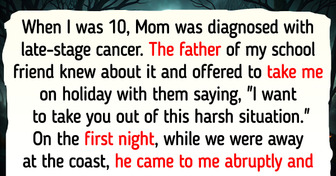
People Shared 10 Mysterious Events That Defy Any Explanation
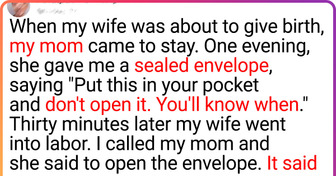
15+ Stepparents Who Were Actually “Parents Who Stepped Up”

I Tracked My Daughter’s Phone and Discovered a Disgusting Secret
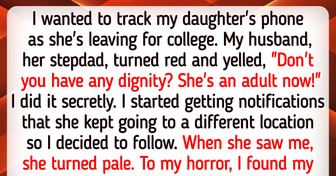
I Refuse to Apologize to My Stepdaughter, I Did Nothing Wrong
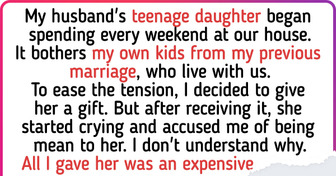
12 Families Who’d Make You Laugh and Cry at the Same Time
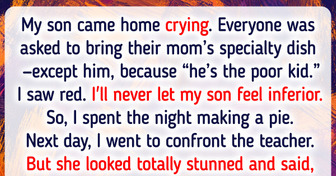
12 People Who Are Still Haunted by Their Medical Visit

My MIL Left My Toddler Sleeping Alone in the Garage — and Her Reason Chilled Me

I Skipped Our Wedding Anniversary for My Sister’s Childbirth — My Wife Made Me a Nasty Surprise
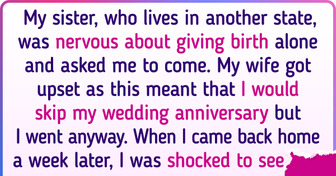
11 Stories That Prove Kindness Hits Harder Than Words
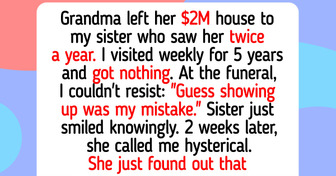
10 Teachers Who Learned Life Lessons From Their Remarkable Students
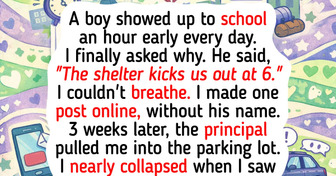
16 Tiny Acts From Strangers That Left Permanent Marks on People
